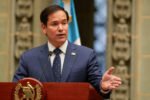Serbian President Aleksandar Vučić announced on Sunday that his government is not considering declaring a state of emergency in response to the escalating protests, even as they have turned violent. However, he hinted that the state is preparing a surprising and “unconventional” response.
A “Surprising” State Response is Coming
Vučić stated that declaring a state of emergency would be a “last resort” due to a “complicated procedure.” He added that in the next “three or four days,” the state will make “surprising decisions” that will look as if “we have withdrawn” or “are afraid,” but that the state’s response “will not be ordinary.” He provided no further details.
The president’s comments came after the fifth night of protests, which saw the most intense clashes in Valjevo and Belgrade. In Valjevo, protesters destroyed and set fire to the offices of the Serbian Progressive Party (SNS), as well as the city administration and prosecutor’s office.
Vučić Condemns Protests and Criticizes Prosecutors
Referring to the recent events as “terrorism,” Vučić said that a “legal and official state reaction” is being prepared and that “everything will be used to restore peace and order.” He criticized the public prosecutor’s office, questioning why they are “pretending not to know how to read the law.” Vučić claimed that the protests, which began as a demand for justice for a tragic accident in Novi Sad, have become a political tool. He added that 137 police officials have been injured during the protests.
The ongoing protests have been organized on social media by student groups and have continued for more than nine months. They were initially triggered by a tragic accident in November of the previous year, which killed 16 people when a concrete canopy collapsed at the Novi Sad railway station. Since then, the movement has expanded to include demands for accountability for corruption and early parliamentary elections.







